Medicare Coverage and Nursing Homes: A Comprehensive Guide
Let’s take a look at what Medicare is, how it works in relation to nursing homes, the stipulations that surround it, and how to navigate collecting payments through them.

The average private room in a nursing home is $10,104 per month in the United States. If you break that down, this equals $332 per day. In contrast, the average cost of a semi-private room is $9,167 per month. Once again, broken down this is $301 per day. At the end of the day, annually a semi-private room costs an average of $110,004. A private room costs an average of $121,248. That’s a whole lot of money!
These are again, rough averages made up of different costs across the country. Really the price of nursing home care depends on many different factors. Some of which include:
- Location.
- Providers seen.
- The length of the stay.
- Special considerations.
In some cases, nursing home facilities have all-inclusive rates. Others tend to charge separately depending on the services needed.
Keeping up with collecting payments from your patients and making sure your revenue cycle runs smoothly comes down to understanding your relationship with your payer. And those who work with the elderly and disabled in a nursing home setting will likely find themselves working with Medicare.
While Medicare may not fully cover a stay in a nursing home, depending on an individual's circumstances, they can still qualify for partial coverage. The last thing you as a provider needs is the cumbersome back and forth between you and Medicare over what is covered and what still needs paid by your patient.
Let’s take a look at what Medicare is, how it works in relation to nursing homes, the stipulations that surround it, and how to navigate collecting payments through them.
Medical Coverage for Nursing Home Care
Medicare is a health insurance program. This federal health program is for people 65 or older,
younger people with certain disabilities and people with end-stage renal disease. Medicare coverage depends on:
- State and federal laws.
- National coverage decisions made by Medicare.
- Local coverage decisions made by companies.
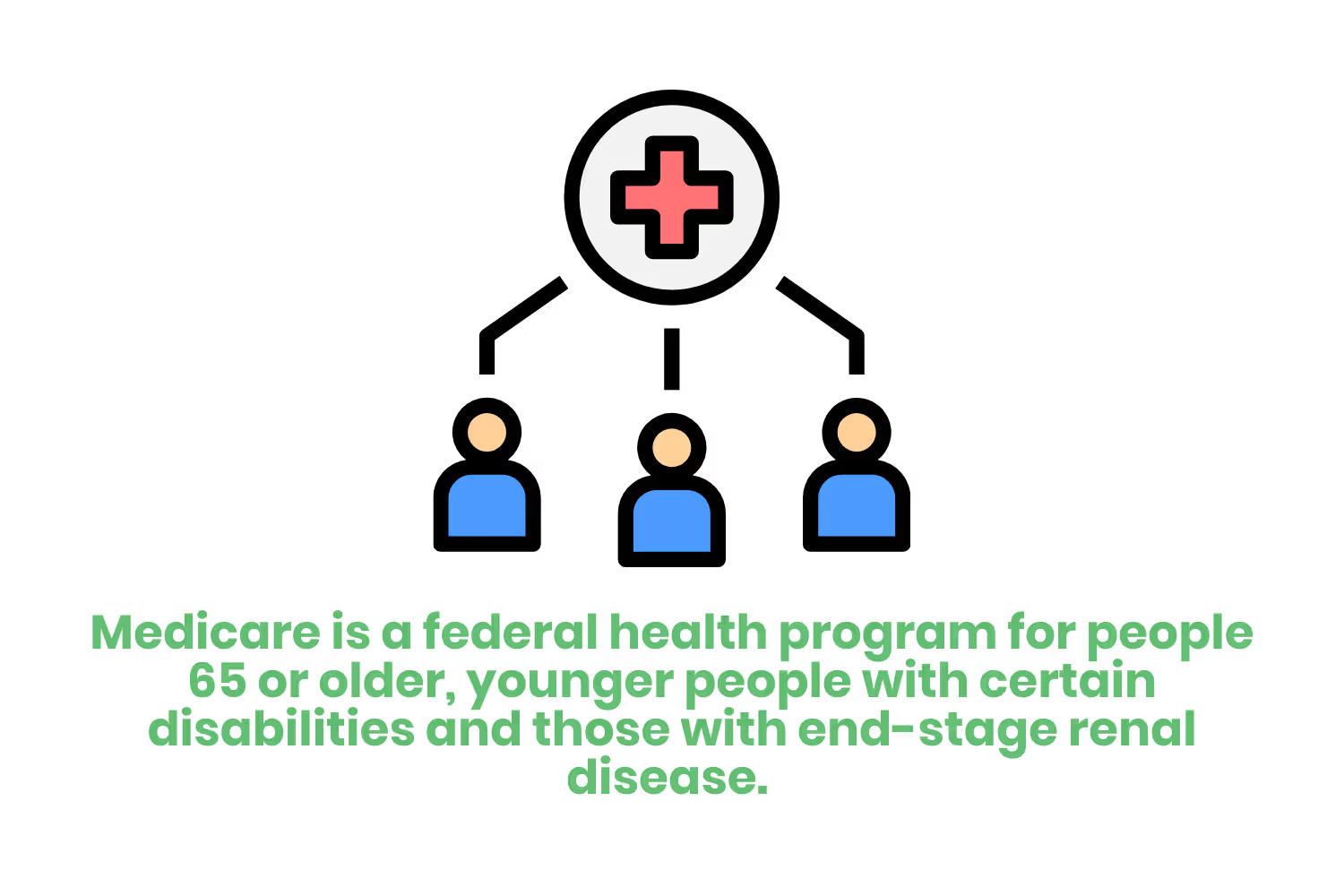
As you can imagine, many of these qualifying populations likely will require assistance of some sort in their lifetime. This can look like many different things, one of which is the assistance found in nursing homes.
Nursing homes cover a wide range of services and personal care assistance. When it comes to Medicare coverage for nursing homes, it all depends on factors such as the facility itself, types of services needed, and the length of the stay.
For example, assisted living facilities (a type of nursing home) tend to offer more personal services as opposed to medically necessary ones. In an assisted living home, you are likely to see services like:
- Provided and prepped meals (up to three a day).
- Assistance with personal care such as bathing, dressing, using the bathroom, and eating.
- Help with medications,
- Housekeeping and laundry.
- 24-hour supervision, security, and on-site staff.
- Social and recreational activities.
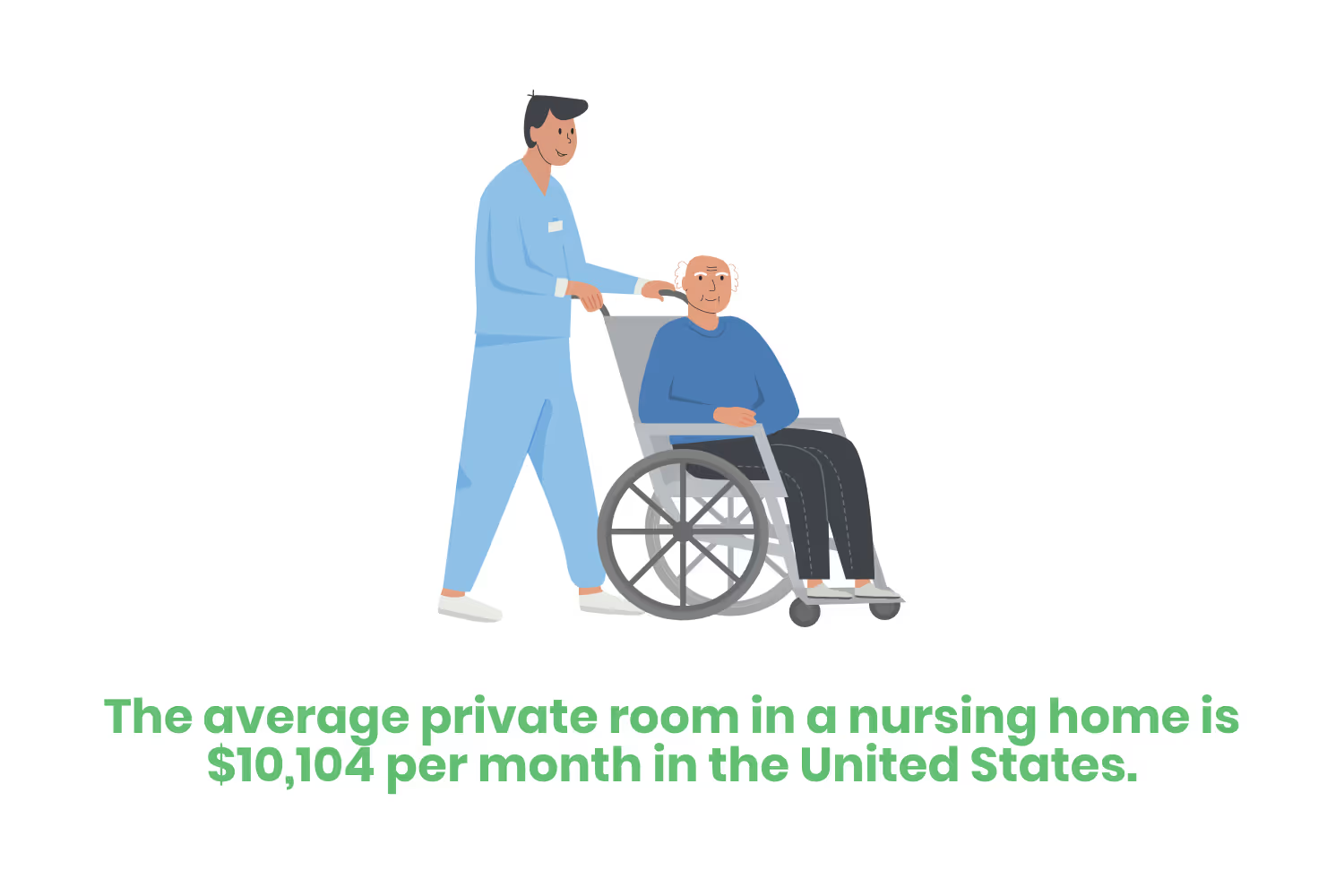
We consider these “personal care services” due to the fact that they can be safely done without professional skills or training at home. Unfortunately, it is rare for Medicare to cover services like these if it's the only care an individual needs, although arrangements vary from state to state.
However, Medicare Part A may cover care in a skilled nursing facility (SNF). Let’s take a look at what qualifies Medicare coverage in this type of nursing home and what that coverage entails.
Medicare Part A: Skilled Nursing Facility (SNF) Care
First let’s look at Medicare Part A in a general scope. This coverage is good for:
- Hospital inpatient care.
- Skilled nursing facility care.
- Nursing home care.
- Hospice.
- Home health care.
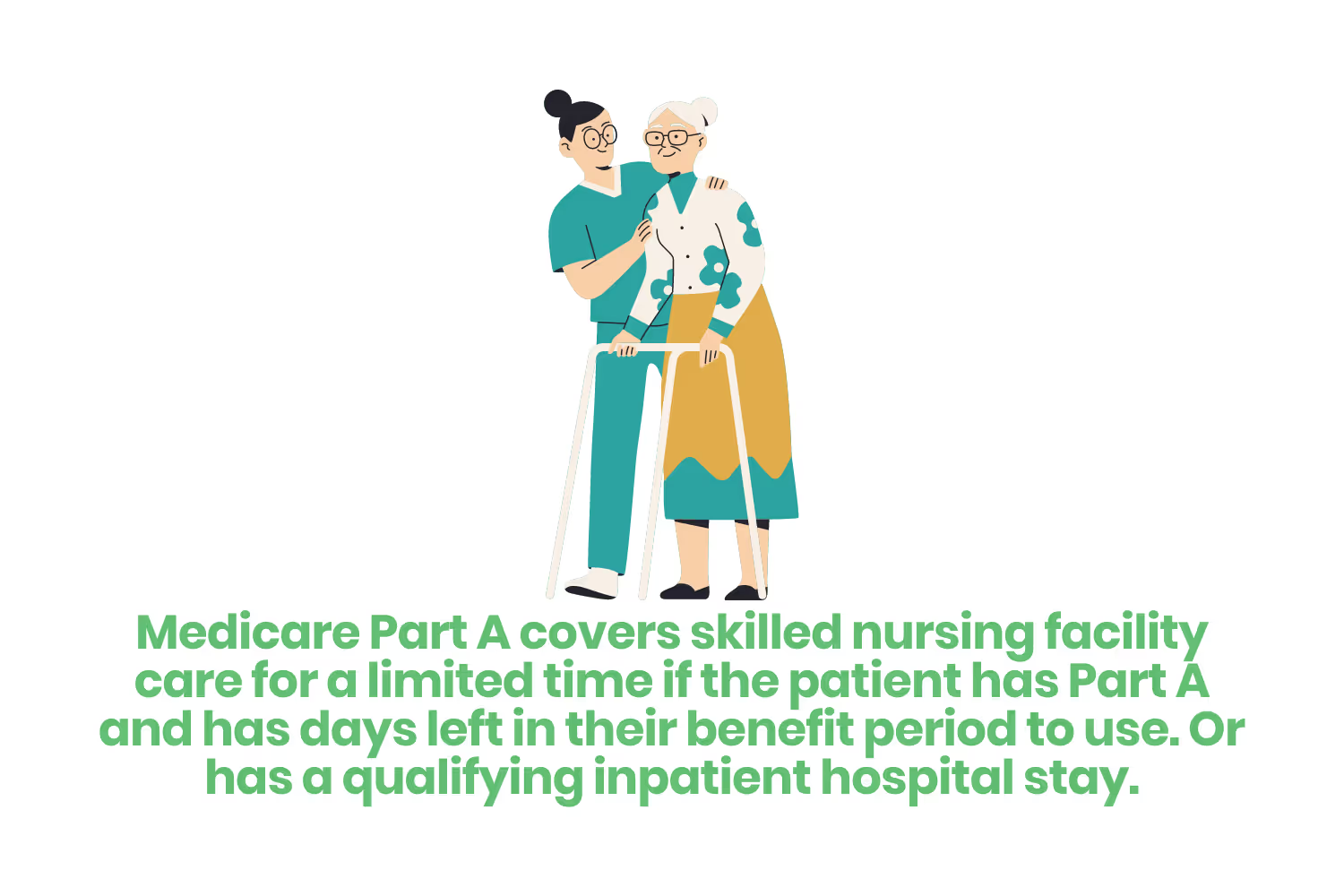
After a hospital stay, a doctor may decide to send their patient to a SNF to receive specialized nursing care. This constitutes coverage of services, at least partially. When looking at coverage for nursing home stays, there are additional conditions that apply. Medicare Part A covers SNF care for a limited time if:
- The patient has Part A and has days left in their benefit period to use.
- The patient has a qualifying inpatient hospital stay. More specifically, the patient was in the hospital for at least three consecutive days.
A doctor must also certify that a patient needs daily skilled care from skilled nursing staff. For reference, skilled nursing care includes services and treatments that can only be safely and effectively performed by healthcare personnel.
So long as the nursing home care is not exclusively custodial nor long-term, an individual should have coverage. Note that a patient must check in to a skilled nursing facility within 30 days of leaving the hospital. On top of that, it must be for the same illness or condition related to the hospital stay.
When talking SNF coverage, here are some of the most common services included:
- Prescription medications.
- Changing sterile dressings.
- Nutrition-related services and meals.
- Rehabilitation services such as physical, occupational, and speech therapy.
Medicare Part B: Additional Coverage for Nursing Home Care
Medicare Part B helps to cover additional medically necessary services for patients in a nursing home setting. These services or supplies help to diagnose or treat medical conditions. Services must also meet accepted standards of medical practice. Such treatments or services might include (but are not limited to):
- An emergency room stay.
- X-rays.
- Chiropractic care.
- Oxygen tanks and other durable medical equipment.
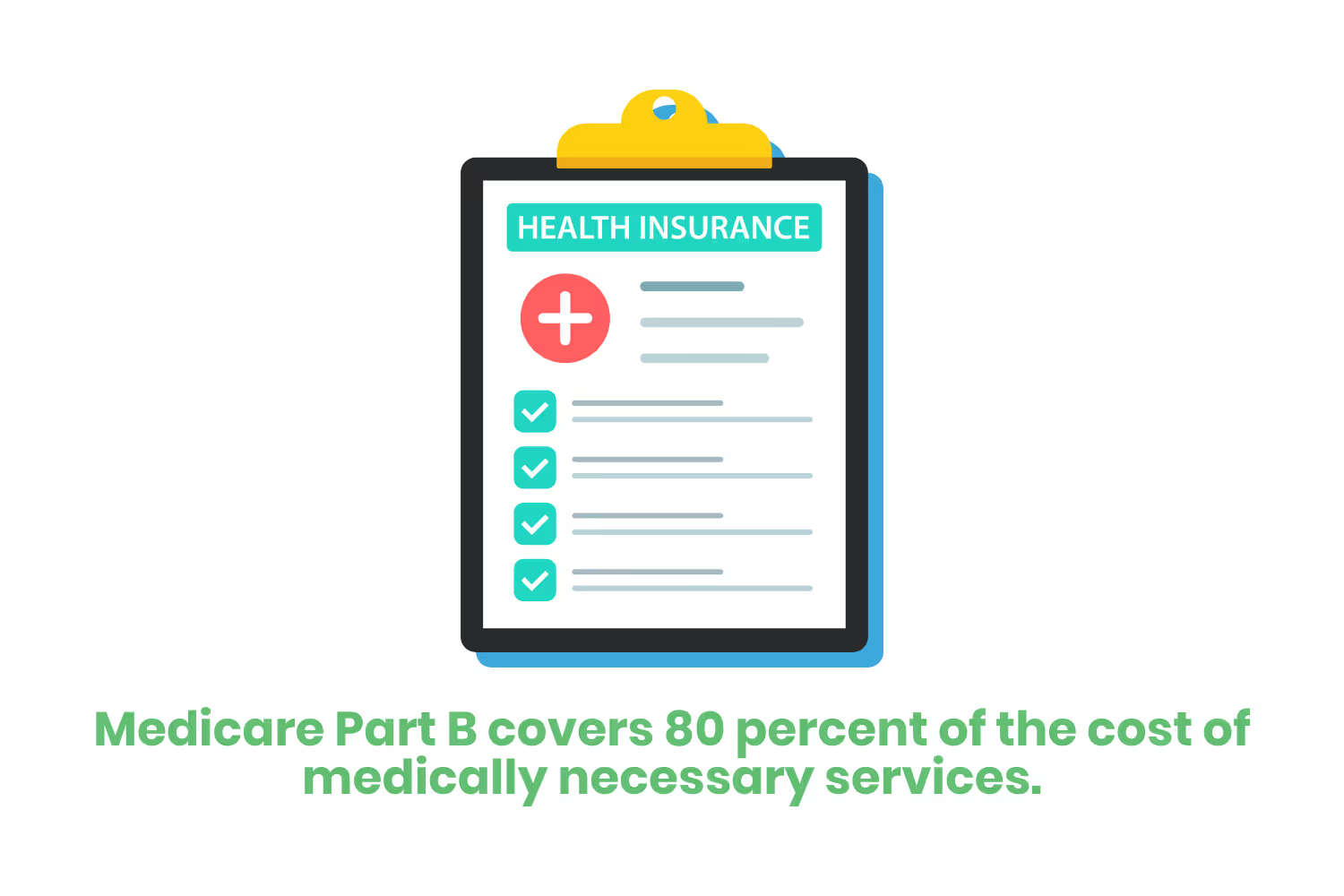
Medicare Part B also covers preventative services, or healthcare that prevents illness or detects it at an early stage. This is when treatment is most likely to work best. So long as the provider accepts Medicare Part B coverage, these services may include:
- Clinical research.
- Ambulance services.
- Durable medical equipment.
- Mental health services.
- Outpatient prescription drugs.
Note that Medicare Part B covers 80 percent of the cost of medically necessary services. So, after we do a little math here, that means the patient is then responsible for the remaining out-of-pocket 20 percent.
Medicare Advantage Plans and Nursing Home Care Coverage
The last plan we will be going over today is the Medicare Advantage Plan, sometimes called “Part C” or “MA Plans”. Private companies offer these plans which are first approved by Medicare. Extra coverage from MA Plans may include vision, hearing, dental, and/or health and wellness programs. The plan also usually includes drug coverage, of Medicare Part D.
Some services that are not covered under Medicare Advantage Plans are:
- Long-Term Care or custodial care.
- Most dental care and dentures.
- Eye exams for prescription glasses.
- Cosmetic surgery.
- Massage therapy.
- Exams for hearing aids.
- Regular or routine physical exams.
Alternative Coverage Options
For those who may not have Medicare coverage, or need additional financial assistance with out of network care, there are other options! Depending on your medical status, the state you live in, and your financial situation, you may be able to find coverage elsewhere. Let’s take a look at a couple of options.
Medicaid
If you are looking for assistance with long-term care that is not covered by Medicare, consider looking at Medicaid. Medicaid can possibly pay for a long-term or residential nursing home stay and cover services, depending on eligibility and whether the services are medically necessary.
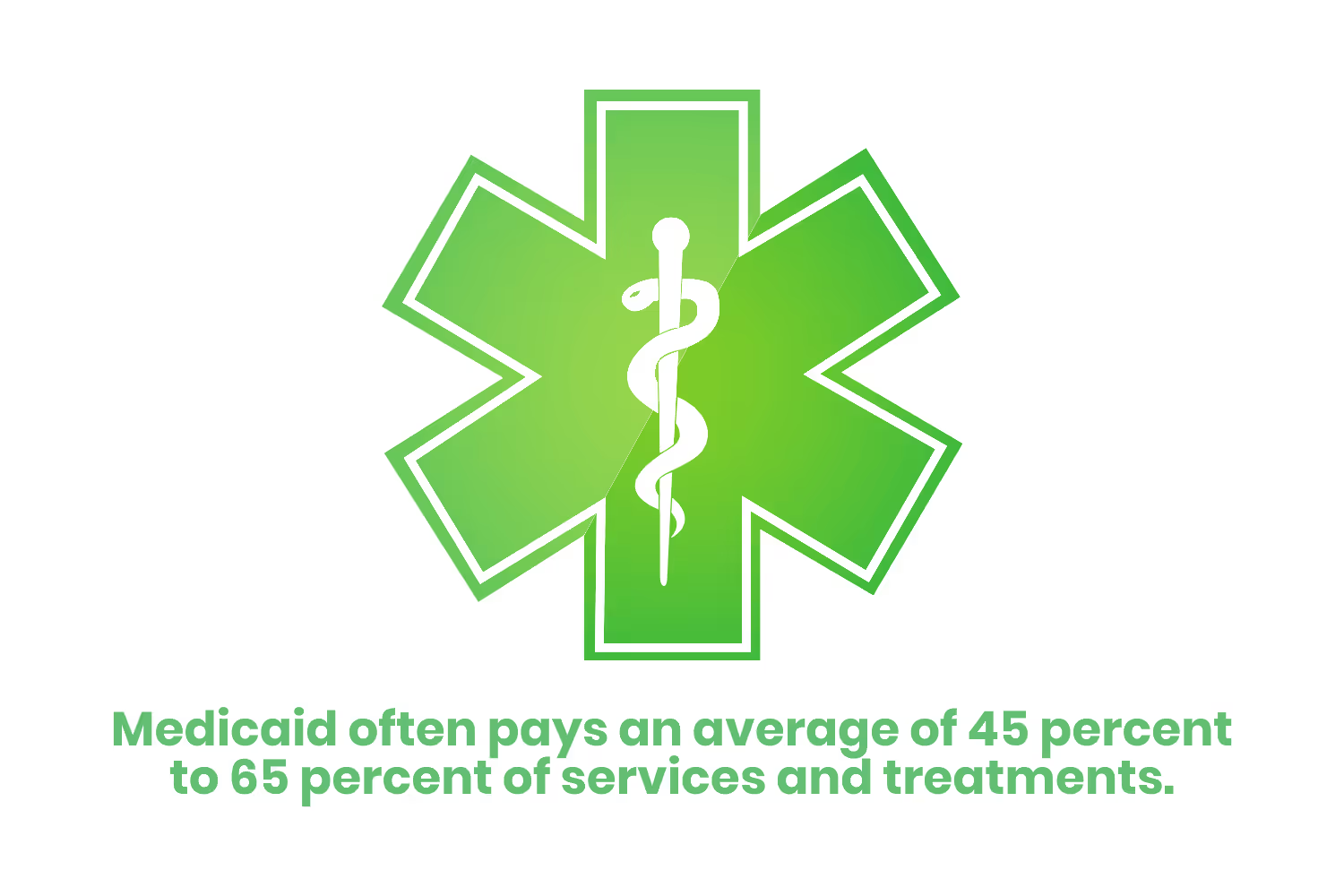
Medicaid may even pay for full coverage of a nursing home, including any additional services required, depending on the state you reside in. Speaking of state by state differences, the baseline level of care tends to vary depending on where you live. But in general, it refers to assistance to those who:
- Lack cognitive function.
- Are unable to engage in activities of daily living.
- Have mental and behavioral health issues.
Like I said before, coverage for Medicaid (just like with Medicare) is going to depend on a few things. Namely, your financial status, the state you reside in, and whatever level of care you need.
But for qualifying individuals, nursing home care is pretty straight forward when it comes to costs and coverage. Medicaid often pays an average of 45 percent to 65 percent of services and treatments.
Private Long-Term Care Options
If you are specifically looking for long-term care, which can include both skilled and non-skilled care, private long-term insurance might be the way to go for you. Just like any other insurance organization, coverage may vary depending on different factors.
Nursing home care, adult day care, assisted living, medical equipment, and informal home care are all examples of services that private long-term insurance may cover. Just make sure you buy from a reliable licensed company that is in your state!
Conclusion
Medicare coverage in nursing homes and other assisted living facilities plays a critical role in providing care to the elderly and disabled. It is a safety net that serves individuals who require skilled nursing care who might otherwise be unable to afford it. Although Medicare coverage does come with limitations and eligibility requirements, it is still an important resource for millions of Americans.
Individuals and their families who are planning their long-term care needs should understand the nuances of Medicare coverage for nursing homes. So should the healthcare organizations themselves as well as the professionals that provide these services.
This includes everything from eligibility criteria and limitations to alternative options. These alternative options, such as Medicaid and long-term care insurance, can help ensure the individual receives the best coverage for any extended nursing home stays.
Emphasize your product's unique features or benefits to differentiate it from competitors
In nec dictum adipiscing pharetra enim etiam scelerisque dolor purus ipsum egestas cursus vulputate arcu egestas ut eu sed mollis consectetur mattis pharetra curabitur et maecenas in mattis fames consectetur ipsum quis risus mauris aliquam ornare nisl purus at ipsum nulla accumsan consectetur vestibulum suspendisse aliquam condimentum scelerisque lacinia pellentesque vestibulum condimentum turpis ligula pharetra dictum sapien facilisis sapien at sagittis et cursus congue.
- Pharetra curabitur et maecenas in mattis fames consectetur ipsum quis risus.
- Justo urna nisi auctor consequat consectetur dolor lectus blandit.
- Eget egestas volutpat lacinia vestibulum vitae mattis hendrerit.
- Ornare elit odio tellus orci bibendum dictum id sem congue enim amet diam.
Incorporate statistics or specific numbers to highlight the effectiveness or popularity of your offering
Convallis pellentesque ullamcorper sapien sed tristique fermentum proin amet quam tincidunt feugiat vitae neque quisque odio ut pellentesque ac mauris eget lectus. Pretium arcu turpis lacus sapien sit at eu sapien duis magna nunc nibh nam non ut nibh ultrices ultrices elementum egestas enim nisl sed cursus pellentesque sit dignissim enim euismod sit et convallis sed pelis viverra quam at nisl sit pharetra enim nisl nec vestibulum posuere in volutpat sed blandit neque risus.

Use time-sensitive language to encourage immediate action, such as "Limited Time Offer
Feugiat vitae neque quisque odio ut pellentesque ac mauris eget lectus. Pretium arcu turpis lacus sapien sit at eu sapien duis magna nunc nibh nam non ut nibh ultrices ultrices elementum egestas enim nisl sed cursus pellentesque sit dignissim enim euismod sit et convallis sed pelis viverra quam at nisl sit pharetra enim nisl nec vestibulum posuere in volutpat sed blandit neque risus.
- Pharetra curabitur et maecenas in mattis fames consectetur ipsum quis risus.
- Justo urna nisi auctor consequat consectetur dolor lectus blandit.
- Eget egestas volutpat lacinia vestibulum vitae mattis hendrerit.
- Ornare elit odio tellus orci bibendum dictum id sem congue enim amet diam.
Address customer pain points directly by showing how your product solves their problems
Feugiat vitae neque quisque odio ut pellentesque ac mauris eget lectus. Pretium arcu turpis lacus sapien sit at eu sapien duis magna nunc nibh nam non ut nibh ultrices ultrices elementum egestas enim nisl sed cursus pellentesque sit dignissim enim euismod sit et convallis sed pelis viverra quam at nisl sit pharetra enim nisl nec vestibulum posuere in volutpat sed blandit neque risus.
Vel etiam vel amet aenean eget in habitasse nunc duis tellus sem turpis risus aliquam ac volutpat tellus eu faucibus ullamcorper.
Tailor titles to your ideal customer segment using phrases like "Designed for Busy Professionals
Sed pretium id nibh id sit felis vitae volutpat volutpat adipiscing at sodales neque lectus mi phasellus commodo at elit suspendisse ornare faucibus lectus purus viverra in nec aliquet commodo et sed sed nisi tempor mi pellentesque arcu viverra pretium duis enim vulputate dignissim etiam ultrices vitae neque urna proin nibh diam turpis augue lacus.




